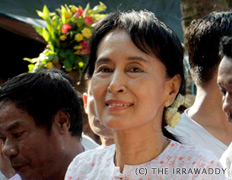
News about Daw Aung San Suu Kyi
Since her release on 13 November 2010, Daw Aung San Suu Kyi has proven that she continues to be a powerful force for social and political progress in Burma.
Follow her efforts to promote human rights, social development, democracy and national reconciliation in Burma in the following articles about her work, her words, and her long-awaited release.
Posts about ‘Daw Aung San Suu Kyi’
Daw Aung San Suu Kyi Works To Make Reconciliation in Burma a Reality
In the month following her release from more than 15 years of unjust captivity over the last 21 years, Daw Aung San Suu Kyi has demonstrated through words and actions why she continues to be a powerful force for social and political progress. While the State Peace and Development Council (SPDC) has maintained its authoritarian command to gain greater personal profit and perpetual military rule, Daw Aung San Suu Kyi has displayed even handed leadership in the nation’s struggle for democracy, ethnic equality and inclusive development. Daw Aung San Suu Kyi’s efforts not only underscore the flaws of the SPDC’s unilateral “Roadmap to Democracy,” but also illuminate a real path towards national reconciliation […]
| |Review on the Flawed Election
[…] A review of the 2010 elections and the flawed results by 10 activist organizations inside Burma. The organizations conclude that the military system will continue to prevail in Burma because the post-election parliament will be dominated by the military and the junta-backed USDP. They propose tasks for the incoming parliament, pledge to continue to improve their coordination and cooperation to work in unity, and express their support for Daw Aung San Suu Kyi, the National League for Democracy and the Committee Representing People Parliament […]
| |Suu Kyi Joins Nobel Laureates in Calling on Obama to Sign Landmine Treaty
Burma’s recently freed opposition leader Aung San Suu Kyi today added her name to the list of Nobel Peace Laureates who have signed a letter to US President Obama, calling upon him to join the Mine Ban Treaty. Fifteen other Nobel Peace Laureates, including Jody Williams and Archbishop Tutu, have also signed the letter-which was sent to Obama on November 30 […]
| |Daw Aung San Suu Kyi’s message to Canada
Burmese democracy leader Aung San Suu Kyi sent a message to the government and the people of Canada through her sister-in-law, Mrs. Lucinda Phillips, yesterday at a meeting on Parliament Hill hosted by Parliamentary Friends of Burma (PFOB) and Canadian Friends of Burma (CFOB).
Her message is as followed:
“I deeply appreciate the award of Honorary Canadian Citizenship, both for myself and because it symbolizes the help that Canada has given my people […]
| |Aung San Suu Kyi asks New Zealand for support
Burmese democracy leader Aung San Suu Kyi has asked for support from New Zealand to help build peaceful democratic reform in her country in the wake of her release from house arrest.
Labour’s Foreign Affairs Spokesperson Maryan Street spoke to the Nobel peace laureate for 20 minutes last night […]
| |Aung San Suu Kyi appreciates the support of the Czech Republic
The leading Burmese dissident Aung San Suu Kyi has thanked for the long-term support of the Czech Republic in the fight for democracy in Burma. She conveyed this message when receiving a letter by former Czech president Václav Havel in which he was congratulating her to her release from house arrest […]
| |European Parliament Condemns ‘Atrocious’ Violations against Karen
The European Parliament passed a Resolution on Thursday 25 November 2010, following sham elections in Burma and the release of Aung San Suu Kyi. The Resolution noted that the elections were not free or fair, and the release of Aung San Suu Kyi by itself did not represent a positive step forward, without other fundamental changes.
The Resolution also highlighted how the “Burmese military continues to commit atrocious human rights violations against civilians in the ethnic Karen homelands on the Thai border, acts which include extrajudicial killings, forced labour and sexual violence …. continues widespread and systematic forced recruitment of child soldiers” […]
| |Burmese Regime Continues Brutal Campaign Against Ethnic Civilians
Christian Solidarity Worldwide (CSW) is concerned by reports that despite the welcome release of Burma’s democracy leader Aung San Suu Kyi, and a high-level visit by UN Burma envoy Vijay Nambiar, the regime continues to perpetrate grave violations of human rights against ethnic civilians, including military attacks and forced labour […]
| |Impunity or Reconciliation in Burma’s Transition
The Burmese government cannot change in a meaningful way until it eliminates the culture of impunity for human rights violations that has developed during the past 48 years. The international community can help this effort […]
| |The Foreign Affairs Committee of the Czech Parliament condemns Burma’s elections and welcomes the release of Aung San Suu Kyi
The Foreign Affairs Committee of the Parliament of the Czech Republic has published a resolution on Burma on the 24th November 2010 calling on the Burmese regime to start a dialogue with the opposition and ethnic groups and enable them to fully participate in the political life. The Committee has also welcomed the release of Burmese leading dissident Aung San Suu Kyi but brought the attention to the fact that there are still over 2 100 political prisoners held in Burmese prisons. The resolution has also mentioned the recent elections in Burma which were labeled as illegitimate […]
| |








 All posts
All posts